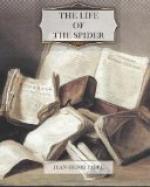They slip in among the others, or, when the layer is too thick, push to the front and pass from the abdomen to the thorax and even to the head, though leaving the region of the eyes uncovered. It does not do to blind the bearer: the common safety demands that. They know this and respect the lenses of the eyes, however populous the assembly be. The whole animal is now covered with a swarming carpet of young, all except the legs, which must preserve their freedom of action, and the under part of the body, where contact with the ground is to be feared.
My pencil forces a third family upon the already overburdened Spider; and this too is peacefully accepted. The youngsters huddle up closer, lie one on top of the other in layers and room is found for all. The Lycosa has lost the last semblance of an animal, has become a nameless bristling thing that walks about. Falls are frequent and are followed by continual climbings.
I perceive that I have reached the limits not of the bearer’s good-will, but of equilibrium. The Spider would adopt an indefinite further number of foundlings, if the dimensions of her back afforded them a firm hold. Let us be content with this. Let us restore each family to its mother, drawing at random from the lot. There must necessarily be interchanges, but that is of no importance: real children and adopted children are the same thing in the Lycosa’s eyes.
One would like to know if, apart from my artifices, in circumstances where I do not interfere, the good-natured dry-nurse sometimes burdens herself with a supplementary family; it would also be interesting to learn what comes of this association of lawful offspring and strangers. I have ample materials wherewith to obtain an answer to both questions. I have housed in the same cage two elderly matrons laden with youngsters. Each has her home as far removed from the other’s as the size of the common pan permits. The distance is nine inches or more. It is not enough. Proximity soon kindles fierce jealousies between those intolerant creatures, who are obliged to live far apart, so as to secure adequate hunting-grounds.
One morning, I catch the two harridans fighting out their quarrel on the floor. The loser is laid flat upon her back; the victress, belly to belly with her adversary, clutches her with her legs and prevents her from moving a limb. Both have their poison-fangs wide open, ready to bite without yet daring, so mutually formidable are they. After a certain period of waiting, during which the pair merely exchange threats, the stronger of the two, the one on top, closes her lethal engine and grinds the head of the prostrate foe. Then she calmly devours the deceased by small mouthfuls.
Now what do the youngsters do, while their mother is being eaten? Easily consoled, heedless of the atrocious scene, they climb on the conqueror’s back and quietly take their places among the lawful family. The ogress raises no objection, accepts them as her own. She makes a meal off the mother and adopts the orphans.




